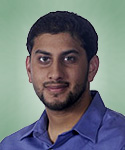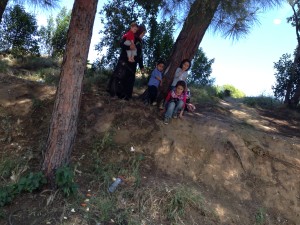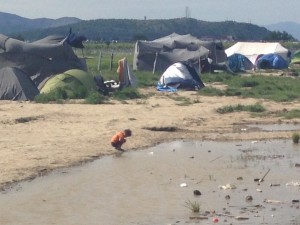May 23rd, 2016
My Third Day in Greece
Ahmad Yousaf, MD

Ahmad Yousaf, MD, is the 2015-16 Ambulatory Chief Resident in Internal Medicine at Rutgers New Jersey Medical School.
1) At one point today in the Idomini refugee camp, I was playing catch with a beautiful baby girl in between some of the tents. She could not have been much older than my own daughter and, like my daughter, would throw the ball backwards over her head instead of towards me and then would giggle for a bit before repeating it again… I could see her father and siblings smiling and watching me play with her; I walked over and began listening to their story. The father spoke to me warmly about how happy he was to meet us and how difficult it is to be refugees for him and his family in the camps. He talked about the near absence of medical care, edible food, and safety. He talked about how far they had come, how their home no longer existed in the city of Yarmulke because it was obliterated during Assad air strikes, and how uncertain every day was. He mentioned how one of his sons went nearly mute from fear of the bomb blasts and now only says a few words… He smiled and said kind words despite the misery he spoke of. At one point he joked: “I invited everyone over last night for a great party — it was so great that the wind made the walls of my tent dance until  they fell over.”
they fell over.”
2) Today we entered a new camp called BP/Hara (named after its location on a BP gas station and the parking lot of the Hara hotel). We treated about 50 patients out of the back of our van full of donated meds and supplies. Syrians, Kurds, Afghanis, and even some Pakistanis, all lined up hoping we could relieve some ailment or suffering. Often we could only provide some ibuprofen, bandage a wound, or treat a fever… It was not complex medicine, but it was something. Sometimes it feels as though all we are really delivering is a tiny bit of dignity and humanity in the few moments we are with them. Other times, it feels as though we did not do anything at all. It is a difficult set of realities to process.
 3) Super heroes exist. I’ve seen them. Today a man pulled up in front of the camp in an RV he owned. His name is Ramees, and he is a physician from the U.K. Every so often, he flies from the U.K. to Romania, where he has his RV parked, drives down to Greece with his vehicle stocked with meds/supplies, and opens his doors and heart to the refugees. He is a one-man show who does this because it is who he is. He has already been here for a couple of weeks and plans on a few more days before he returns home.
3) Super heroes exist. I’ve seen them. Today a man pulled up in front of the camp in an RV he owned. His name is Ramees, and he is a physician from the U.K. Every so often, he flies from the U.K. to Romania, where he has his RV parked, drives down to Greece with his vehicle stocked with meds/supplies, and opens his doors and heart to the refugees. He is a one-man show who does this because it is who he is. He has already been here for a couple of weeks and plans on a few more days before he returns home.
I meet people like him and feel ashamed about how little I’ve done. This man (and there are many men and women like him), has sacrificed immense amounts family time, money, general comforts, and heart to come in and give something of himself to people he’s never met and probably will never see again. He gives me hope that, despite all of the terrible things in this world, there are still people like him who put it all on the line to make a difference.
4) I am more and more convinced that everyone needs to come and see the Syrian refugee crisis for themselves. These words and pictures mean nothing in comparison to staring into the eyes of a human being who has lost everything and wants nothing except to just have a chance at a normal life. I cannot convey the hurt and tears and fear and pain in a post. I cannot make you understand what I feel when I put my hand on the head of a child who has lost his parents or an arm around a man who has been stripped of his honor. I cannot convey the loneliness and hopelessness of knowing you will sleep in a tent on concrete tonight and the next night and so on… there are no words for these things.


Thank you for posting these stories of your trip to Greece. My heart aches after reading your posts from your first 3 days.
I hope you can share your stories more, so more people can understand what is really going on.
THANK YOU for doing what you can to help. You are an amazing person. I am just a web designer, I have no medical knowledge. What can people like me do to help?
My wife and son are going to the Greek refugee camps for a week on Friday. It always seems like so little to do a week or two long mission trip, and it tears at the heart to think maybe it would have just been better to send money, but then, maybe not. Still sending money anyway, chronically, diffusely, with the joy that we are privileged to have it to send.
There is an army out there, of people who have devoted their lives to helping strangers in a strange land.
Thank you Dr. Yousaf.